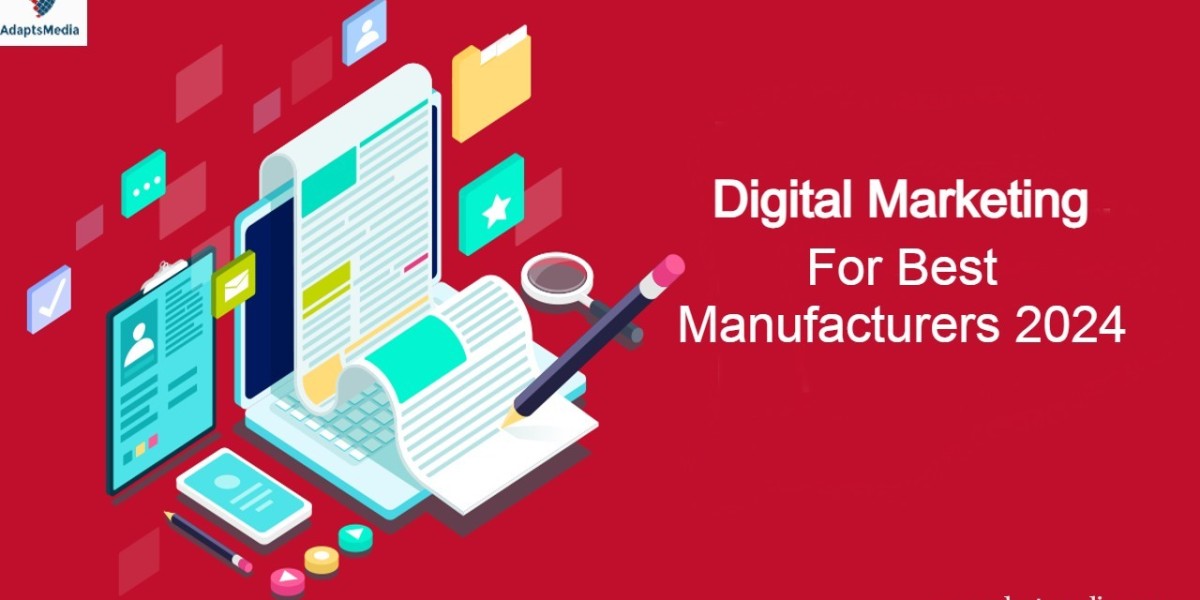In today's digital age, manufacturers must embrace digital marketing to remain competitive and reach their target audience effectively. This comprehensive guide explores the importance of digital marketing for manufacturers, the strategies involved, and how to implement them for maximum impact.
Understanding Digital Marketing for Manufacturers
Digital marketing refers to using online channels to promote products and services. For manufacturers, this includes leveraging digital tools and strategies to connect with potential clients, streamline operations, and enhance brand visibility. Digital marketing encompasses various tactics such as search engine optimization (SEO), Digital marketing company in sharjah content marketing, social media marketing, email marketing, and more.
The Importance of Digital Marketing for Manufacturers
Enhanced Brand Visibility
Manufacturers traditionally rely on word-of-mouth, trade shows, and direct sales. However, the internet provides a vast platform to reach a global audience. Digital marketing helps manufacturers enhance their brand visibility, ensuring potential customers can find them easily online.
Improved Customer Engagement
Digital marketing allows manufacturers to engage with customers in real-time. Through social media platforms, email newsletters, and content marketing, manufacturers can interact with their audience, answer queries, and build lasting relationships.
Cost-Effective Marketing
Compared to traditional marketing methods, digital marketing is often more cost-effective. It allows manufacturers to reach a broader audience with a smaller budget. Techniques like SEO and content marketing provide long-term benefits without the ongoing costs associated with traditional advertising.
Data-Driven Decision Making
One of the significant advantages of digital marketing is the ability to track and analyze performance metrics. Manufacturers can use data analytics to understand customer behavior, measure campaign success, and make informed decisions to optimize their marketing strategies.
Key Digital Marketing Strategies for Manufacturers
Search Engine Optimization (SEO)
1. Keyword Research Keyword research is the foundation of effective SEO. Manufacturers need to identify relevant keywords that potential customers use to search for products. Tools like Google Keyword Planner and SEMrush can help in discovering high-volume and low-competition keywords.
2. On-Page SEO On-page SEO involves optimizing individual web pages to rank higher in search engines. This includes using relevant keywords in titles, meta descriptions, headers, and throughout the content. Additionally, manufacturers should focus on improving site speed, mobile-friendliness, and user experience.
3. Off-Page SEO Off-page SEO refers to actions taken outside of your website to improve its search engine rankings. This primarily involves building high-quality backlinks from reputable websites. Manufacturers can achieve this through guest blogging, partnerships, and participating in industry forums.
Content Marketing
1. Blogging Regularly publishing informative and valuable blog posts can establish manufacturers as industry leaders. Topics can range from industry trends and product innovations to case studies and how-to guides. Incorporating relevant keywords in blog posts can also improve SEO.
2. White Papers and E-Books White papers and e-books provide in-depth knowledge on specific topics and can be used to capture leads. Offering these resources in exchange for contact information helps build an email list for future marketing efforts.
3. Video Marketing Video content is highly engaging and can showcase manufacturing processes, product demonstrations, and customer testimonials. Platforms like YouTube and Vimeo are excellent for hosting and sharing videos, while also enhancing SEO.
Social Media Marketing
1. Platform Selection Manufacturers should choose social media platforms that align with their target audience. LinkedIn is ideal for B2B marketing, while Facebook and Instagram can be effective for reaching a broader consumer base.
2. Content Strategy A consistent and strategic approach to social media content is crucial. Manufacturers can share industry news, behind-the-scenes looks at manufacturing processes, and customer success stories. Engaging visuals and videos tend to perform well on social media.
3. Paid Advertising Social media platforms offer robust advertising options that allow manufacturers to target specific demographics, interests, and behaviors. Paid ads can drive traffic to websites, generate leads, and increase brand awareness.
Email Marketing
1. Building an Email List Building a targeted email list is essential for effective email marketing. Manufacturers can collect email addresses through website sign-ups, trade shows, and lead magnets like white papers and e-books.
2. Personalized Campaigns Personalization is key to successful email marketing. Manufacturers can segment their email lists based on factors like industry, company size, and past interactions to send tailored content that resonates with recipients.
3. Automation Email marketing automation tools enable manufacturers to send timely and relevant emails without manual effort. Automated campaigns can nurture leads, follow up on inquiries, and promote new products.
Pay-Per-Click (PPC) Advertising
1. Google Ads Google Ads is a powerful tool for manufacturers to reach potential customers actively searching for products. Manufacturers can create targeted ads that appear at the top of search engine results, driving traffic and generating leads.
2. Retargeting Retargeting ads are designed to re-engage users who have previously visited your website but did not convert. These ads remind potential customers of your products and encourage them to return and complete a purchase.
3. Display Advertising Display ads are visual advertisements that appear on websites within the Google Display Network. Manufacturers can use display ads to increase brand visibility and reach a broader audience.
Implementing a Digital Marketing Strategy
Define Goals and Objectives
The first step in implementing a digital marketing strategy is to define clear goals and objectives. Manufacturers should determine what they want to achieve, whether it's increasing website traffic, generating leads, or boosting sales. These goals will guide the selection of tactics and the measurement of success.
Conduct a Digital Audit
A digital audit involves assessing the current state of your online presence. Manufacturers should evaluate their website, social media profiles, content, and SEO performance. This audit will identify strengths, weaknesses, and opportunities for improvement.
Develop a Content Plan
A well-thought-out content plan is essential for consistent and effective digital marketing. Manufacturers should create a content calendar that outlines what type of content will be produced, when it will be published, and on which platforms.
Invest in Tools and Resources
Investing in the right tools and resources can streamline digital marketing efforts. SEO tools, social media management platforms, email marketing software, and analytics tools are valuable assets that can enhance efficiency and effectiveness.
Monitor and Measure Performance
Regularly monitoring and measuring the performance of digital marketing campaigns is crucial. Manufacturers should track key metrics such as website traffic, conversion rates, social media engagement, and email open rates. Analyzing these metrics will provide insights into what is working and what needs adjustment.
Adapt and Optimize
Digital marketing is dynamic, and manufacturers must be prepared to adapt and optimize their strategies based on performance data. Continuous improvement is essential to stay ahead of competitors and meet evolving customer expectations.
Conclusion
Digital marketing is no longer optional for manufacturers; it's a necessity in today's competitive landscape. By leveraging SEO, content marketing, social media, email marketing, and PPC advertising,Digital agency abu dhabi manufacturers can enhance brand visibility, engage with customers, and drive business growth. Implementing a well-defined digital marketing strategy, supported by data-driven decision-making and continuous optimization, will ensure manufacturers stay ahead of the curve and achieve long-term success.
Embracing digital marketing requires time, effort, and resources, but the benefits far outweigh the investment. Manufacturers that prioritize digital marketing will not only survive but thrive in the digital age, reaching new heights of success and innovation.



